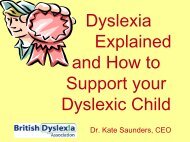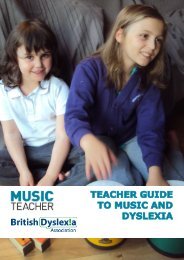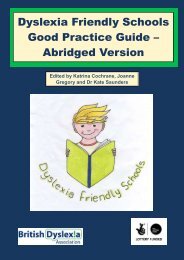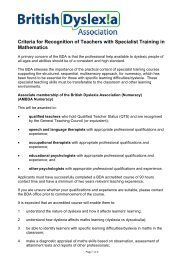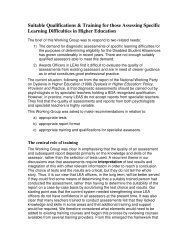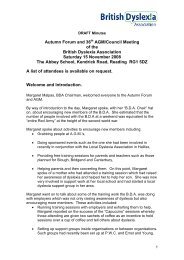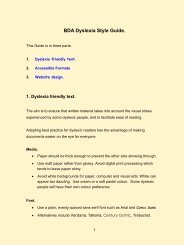Intervention for Dyslexia - The British Dyslexia Association
Intervention for Dyslexia - The British Dyslexia Association
Intervention for Dyslexia - The British Dyslexia Association
Create successful ePaper yourself
Turn your PDF publications into a flip-book with our unique Google optimized e-Paper software.
It is not until Level 2b that children are ‘almost entirely accurate’ readers. 48%–51% of<br />
‘accelerated progress’ Reading Recovery children and 38%-43% of all Reading Recovery<br />
children who completed their programmes achieved Level 2b or above, compared with<br />
71% of all children in England in both years. Moreover, most of these Reading Recovery<br />
children (35%–37% accelerated progress, 28%-31% all completed programmes)<br />
achieved Level 2b, not any level above this. Only 12% of accelerated progress children<br />
and 9%–10% of all completed programme children achieved Level 2a, and 3% or fewer<br />
achieved Level 3, compared with 26% of all children in England.<br />
At best, Reading Recovery enabled children to per<strong>for</strong>m within the low average range<br />
(2c) <strong>for</strong> their age, whilst about 30% of completed programme children remained<br />
consistently at Level 1 or working towards Level 1, and only 10%–12% were working at<br />
Level 2a or above. Remember, Level 2a is the level at which children can ‘tackle<br />
unfamiliar words’ – the necessary feature that defines successful development of a selfsustaining<br />
word recognition system.<br />
<strong>The</strong> same exercise has been conducted examining the Key Stage 1 writing National<br />
Curriculum assessment per<strong>for</strong>mance of children on Reading Recovery cohorts from<br />
2003–04 to 2006–07, as well as comparing the 2005–06 and 2006-07 Reading Recovery<br />
cohorts with National Curriculum assessment results of all children in England in 2006<br />
and 2007. Without going into all the details, the results tell a similar story to the one<br />
described above <strong>for</strong> reading. 25%-31% of ‘accelerated progress’ children and 36%-40%<br />
of all children who completed their Reading Recovery programme scored at the lowest<br />
levels <strong>for</strong> writing (Level 1 or Working towards Level 1). At best, Reading Recovery<br />
succeeded in getting about 40% of children who completed their programmes into the<br />
low average range of writing per<strong>for</strong>mance <strong>for</strong> their age (2c). A further 35%–40% of<br />
children who completed their programmes were below this range. Thus, 75%–80% of<br />
children completing Reading Recovery were low average writers or worse by the end of<br />
Key Stage 1, with only two in ten writing within the average range (Level 2b) or above,<br />
compared with six in ten of all pupils in England. Fewer than one in a hundred Reading<br />
Recovery children (whether we count those making accelerated progress or all pupils<br />
completing the programme) achieved Level 3 in writing, compared with 13%-14% of all<br />
children in England.<br />
5.5.3 Reading Recovery children’s standardised reading test results<br />
<strong>The</strong> Reading Recovery annual reports <strong>for</strong> 2004-05 to 2006-07 also give measures of<br />
children’s progress on the <strong>British</strong> Abilities Scales Word Reading Test, Second Edition<br />
(BAS-II). For each of the three years the results published are identical: i.e. the average<br />
reading age of children entering programmes was 4 years 10 months, and average<br />
reading age of children of those who had been ‘successfully discontinued’ was 6 years 7<br />
months (Douëtil, 2005, p.12; 2006, p.12, 2007a, p. 14). On the face of it, this looks like<br />
good progress. However, be<strong>for</strong>e reaching this conclusion, two factors need to be<br />
considered. First, 6 years 7 months was the average reading age of only those children<br />
who responded well to Reading Recovery, and does not take into account those pupils<br />
<strong>for</strong> whom Reading Recovery did not seem to be such an effective intervention. Secondly,<br />
a child can achieve a reading age of 6 years 7 months on BAS-II with knowledge of only<br />
a few words. To attain a reading age of 6 years 7 months, only 21 words on the test<br />
have to be read correctly, which can easily be achieved by a child who has memorised<br />
some very high frequency common words (e.g. the, up, you, at, said, out), and knows<br />
and can use single letter sounds, plus the simple digraphs ‘sh’ and ‘th’. In other words,<br />
<strong>Intervention</strong> <strong>for</strong> <strong>Dyslexia</strong> 117



